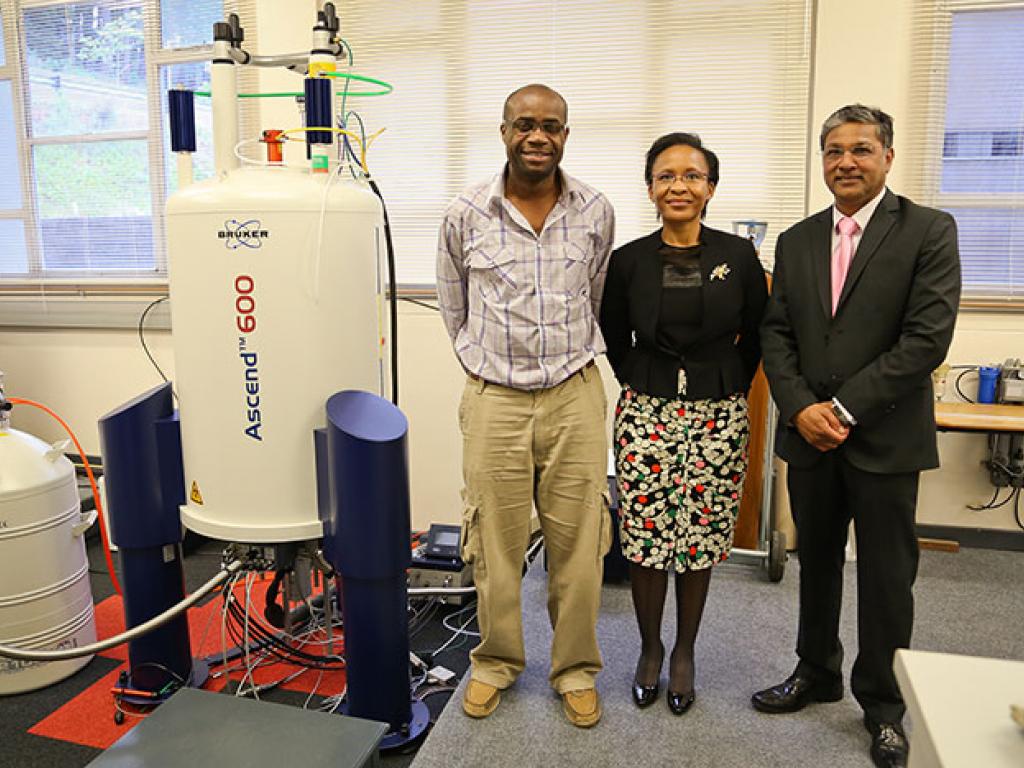Powerful spectrometer takes drug discovery to new level


Nano viewpoint: (From left) Prof Kelly Chibale explains the workings of the Department of Chemistry's new 600MHz nuclear magnetic resonance spectrometer, coupled to a cold probe, to the National Research Foundation's Dr Linda Mtwisha and Gansen Pillay. The equipment will allow researchers to work in nano-concentration range to identify new molecules for drug development. The NRF helped to fund the facility.
The 600MHz machine, housed in the chemistry department, is a special piece of equipment, rare but not unique. It's the cold probe that really sets it apart, allowing researchers to work in the nano-concentration range and identify new molecules, the building blocks of new drugs, in their intricate biological systems.
"The NMR spectrometer gives us a picture of both known and unknown molecules," said Professor Kelly Chibale, director of the South African Medical Research Council Drug Discovery and Development Research Unit, founder and director of the UCT Drug Discovery and Development Centre (H3-D) and full member of the Institute of Infectious Disease and Molecular Medicine (IDM).
"If we're using a molecule from a plant or the ocean and we have no idea what its structure looks like, this powerful tool helps us elucidate or unravel that structure.
"With the powerful magnetic field and the added sensitivity rendered by the cold probe, we can get pictures of molecules in the nano-mode range in very low concentrations. This includes studying the interaction of proteins with small molecules."
The additional level of sensitivity also allows researchers to analyse very tiny quantities of complex biological systems.
Systems biology approach
"Systems biology is all about analysing complex biological mixtures and this facility allows us to look at tiny quantities of biological samples we wouldn't normally have been able to detect. Science has moved from a reductionist approach of individual molecules to systems."
The cold probe is so sensitive that the whole apparatus has been set on a concrete plinth in the ground to avoid the vibrations of the PD Hahn Building, in which it is housed.
"The sensitivity of the instrument is limited by the thermal noise of the electronics," said the department's Professor Graham Jackson. "By cooling the electronics to liquid nitrogen temperatures we can lower that noise, and that's why we can go to such low concentrations of analyses − and why it's so sensitive.
"Combining the 600MHz with a cold probe also gives us the sensitivity that augments and complements modern technologies in other departments such as proteomics, genomics, and all systems biology."
The facility has been a long time coming but thanks to funding from the Faculty of Science, the University Equipment Committee and the National Research Foundation's National Equipment Programme, UCT has been able to take this technological step up.
One of a kind in Africa
Though the university has three NMR spectrometers, the 600MHz with the cold probe is the only facility of its kind in Africa, and one of very few in the world.
The department's medicinal chemistry goals are set against the growing burden of disease, particularly in Africa where both communicable and non-communicable diseases are rife.
On the other side is the massive market for leading therapeutic drugs that drives research and development. (The World Health Organisation estimates the global pharmaceutical market to be worth US$300 billion a year, a figure expected to rise to US$400 billion in the next three years). There are enormous incentives to pursue new methods in drug target identification, screening (target- and whole cell-based), synthesis and drug development.
Already there have been major developments from UCT.
In 2012 UCT's H3-D team and its Swiss partner, Medicines for Malaria Venture, made world headlines when they announced that they had identified a compound with the potential to become part of a single-dose cure for all strains of malaria − and possibly block transmission of the parasite from person to person via the mosquito.
"Acquisition of this state-of-the-art 600 MHz NMR spectrometer with a cold probe presents us with a unique opportunity to go to the next level, which will put us at the forefront of innovative, transdisciplinary research in chemical biology," said Chibale.
"The 600MHz NMR spectrometer is chemistry; but this machine with the cold probe benefits science, medicine, the IDM, and everyone in the health arena.
"This equipment opens up so many fields we hadn't previously explored. Importantly, UCT students will be exposed to the technology."
